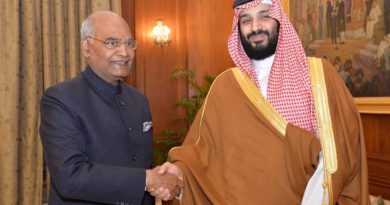Time to support the only viable opposition to Iranian Mullah regime
by Saeed Abed
Vice President Mike Pence, described Ashraf 3 as “the home of hope for a free and democratic Iran”
For more than four decades, the Mullahs’ regime has maintained that the People’s Mojahedin of Iran (PMOI/MEK) has ended and their office has closed. Even the title of “grouplet” has not yet removed the largest, most influential, and all-encompassing political organization of the last half-century from its literature.
The bloodbath started after 500,000 people protested on June 20, 1980. Thousands of MEK members and supporters were put to death, and in one instance, more than 30,000 of its members were massacred in the summer of 1988. This group has carried out more than one hundred operations, both big and small, and it has held and continues to hold the most political prisoners in the last forty years. It has the most supporters among Iranians abroad and is able to host an annual gathering of 100,000 people abroad.
However, it appears that the Supreme Leader of the regime did not comprehend where to hold chanting and mourning if these Mujahideen were defeated and had become a “grouplet”. What purpose do the countless movies, books, interviews, “documentaries”, magazines, and reports against the MEK serve if they are irrelevant?
Absolute political systems and dictatorships, which depend on a concentration of wealth and power in the hands of the ruling class and those close to them, have historically failed. A democratic political system was the only viable alternative to the new world. The Iranian people began the struggle for a democratic political structure with the Constitutional Revolution against the degenerate Qajar tyranny one hundred and sixteen years ago, before many democratic countries today, and they have achieved this goal at great cost to this day.
Reza Khan (the father of the Shah) was the first and most significant domestic factor that caused the project to democratize Iran’s political system to be delayed. He established a new authoritarian monarchy that was harsher and more savage than the Qajar tyranny and completely buried every legal document that had survived as a constitution. While the Iranian society was yelling for independence and freedom in the streets after the Pahlavi dynasty was destroyed, it was forced to deal with a regime that was far more brutal and powerful than the previous dictatorship and even all previous governments.
Khomeini’s regime was not a Pahlavi alternative because, in broad sense, if the monarchy was to be buried, it had to be different in form and content. However, the same elements of authoritarianism and dictatorship—and even the same kind of absolute government—brought with them a person who had some unreliable electoral systems.
Given the characteristics of this regime, one must search for a political current that presents the opposing ideologies of the Shah and the Mullah. That is, a democratic republic. The National Council of Resistance of Iran (NCRI), which has for many years now presented and declared a clear plan for the establishment of a democratic republic based on the separation of religion and state and a clear demarcation with the Mullah and Shah, is the only organization able to be in such position. No other political party or current has, as of yet, demonstrated such a history.
The NCRI has been a political organization with regular administrative and legal frameworks for more than 40 years. In fact, throughout Iran’s history, it has been the longest-lasting political coalition to take the shape of a reliable and powerful organization. Every individual or movement, regardless of the number of its supporters or its social base, has the same right to vote as the other council members in this political organization, which is completely democratic.
For decades following the overthrow of the Mullahs regime, the council has been presenting a specific plan for the establishment of a democratic republic, which is now presented in the form of a 10-point plan by Ms. Rajavi, the president-elect and acting head of state. It is acknowledged throughout the world as Iran’s modern and democratic program following the mullah regime.
One of the most crucial conditions for a political alternative, and the reason the regime intends to boycott it, is the support that the reactionary-authoritarian-colonial company of the Shah and the Mullah are attempting to obscure and disregard. Political and government officials from both Europe and the United States, as well as parliamentary delegations from both continents, provide this support.
Another example is the visit by Mike Pence, the 48th Vice President of the United States, and his meeting with Mrs. Maryam Rajavi, President-elect of the Iranian Resistance, at Ashraf 3, the MEK headquarters, in the afternoon of June 23, 2022.
In his speech to the gathering of MEK members at Ashraf 3, 1,000 of whom were former political prisoners during the monarchy dictatorship and also during the current authoritarian regime, Vice President Mike Pence, described Ashraf 3 as “the home of hope for a free and democratic Iran”. He added, “I have traveled more than 5,000 miles from my home in Indiana to be here today because we share a common cause….I can say with certainty that the American people support your goal of establishing a secular, democratic, non-nuclear Iranian republic that derives its just powers from the consent of the governed”.
On May 16, 2022, former US Secretary of State, Mike Pompeo, also visited Ashraf 3 and met with Mrs. Maryam Rajavi.
Mr. Pompeo said, “A serious missing factor in U.S. policy towards Iran has been the lack of political support for the organized opposition… Now, to correct the Iran policy, no matter who is in the White House, it is a necessity for the U.S. administration to reach out to the Iranian Resistance and take advantage of its tremendous capabilities. Ashraf 3 is one such place to focus on.
Mr. Pompeo also spoke about the leadership capabilities of the Iranian Resistance which he said has “a real political voice in Washington and around the world” and said, “I’d also like to recognize President-elect Maryam Rajavi. Under her leadership, the National Council of Resistance of Iran is laying the groundwork for a free, sovereign, and democratic republic in Iran.”
Both the removal of the regime and the preservation of the accomplishments of the new revolution are ensured by the existence of the Resistance units and the National Liberation Army of Iran, which has a regular, principled, and steely organization.
Saeed Abed is an expert on Iran and the Middle East. He is a Human Rights Activist, belonging to the National Council of Resistance of Iran (NCRI) Foreign Affairs Committee.



